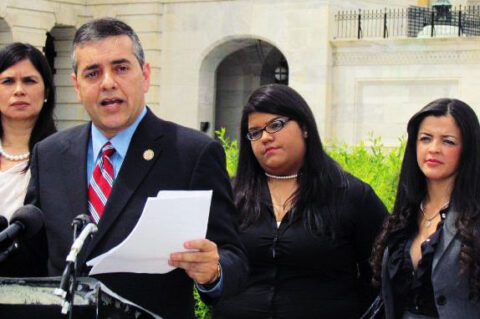Border Enforcement
Beyond A Border Solution
- Asylum
- May 3, 2023
America needs durable solutions. These concrete measures can bring orderliness to our border and modernize our overwhelmed asylum system. Read…
Read More
After 30 Years, Plyler v. Doe Decision Survives but Remains Under Attack
Thirty years ago today, the Supreme Court issued its landmark decision in Plyler v. Doe, holding that states cannot deny a free public education to students for lack of valid immigration status. The decision has since opened the schoolhouse doors to untold numbers of children who might otherwise be deprived of a basic education. Yet today, the decision remains under continued attack from critics who—as part of an ongoing effort to put the issue back before the Justices—appear willing to sacrifice the welfare of U.S. citizens. Read More

After 30 Years, Plyler v. Doe Decision Survives but Remains Under Attack
Thirty years ago today, the Supreme Court issued its landmark decision in Plyler v. Doe, holding that states cannot deny a free public education to students for lack of valid immigration status. The decision has since opened the schoolhouse doors to untold numbers of children who might otherwise be deprived of a basic education. Yet today, the decision remains under continued attack from critics who—as part of an ongoing effort to put the issue back before the Justices—appear willing to sacrifice the welfare of U.S. citizens. Read More

House Votes on Immigration Demonstrate Need for Bolder Executive Action
Last week, the House of Representatives passed an appropriations bill that demonstrates how out of step they are with the public on immigration. House Members passed a series of amendments designed to stop the Obama administration from pursuing humane immigration policies, voting to block funds for any prosecutorial discretion activities, including the new 3 and 10 year bar rule that would allow many applicants to remain in the United States while their applications were being processed. Other amendments would prohibit the administration from cutting 287(g) agreements, funding any alternatives to detention or the ICE Public Advocate’s Office, and even providing translation services for people with limited English proficiency. Read More

Advocates Call on Obama Administration to Protect Immigrant Families, Not Deport Them
Nearly a year ago, ICE Director John Morton issued a memo on prosecutorial discretion which led to the review of 300,000 immigration cases currently in removal proceedings. Advocates initially applauded this announcement, hoping that the administration would move quickly to close low-level, non-criminal immigration cases. But today, disappointed by the program’s low closure rate, advocates and community leaders called on the Obama administration to make good on its promise of using of prosecutorial discretion to protect DREAMers and immigrant families from deportation. Read More

Updated Figures Highlight Shortfalls of Prosecutorial Discretion Program
As reported in today’s New York Times, the Department of Homeland Security has reviewed nearly 300,000 pending deportation cases over the past seven months in search of low-priority immigrants deserving prosecutorial discretion. While immigrant advocates cheered the policy when it was announced, figures released yesterday suggest that the program is not only falling short of initial expectations, but that the numbers are heading in the wrong direction. Read More

Filling Quotas or Setting Priorities? ICE Announcement to Increase Deportations Raises Concerns
U.S. Immigration and Customs Enforcement (ICE) recently announced that it would pull 150 agents from desk jobs and add them to Fugitive Operations Teams—teams created to locate and detain “fugitive immigrants” who pose a threat to the nation or the community or who have a violent criminal history—in order to find and deport additional “criminal aliens.” According to the LA Times, ICE reported it was "experiencing a shortfall in criminal removals for the fiscal year" and need to increase the numbers. While it’s a good idea for ICE to use limited resources pursuing serious criminals, the reality is that ICE’s definition of “criminal alien” is very broad and the Fugitive Ops Team end up deporting unauthorized immigrants who pose no threat to the community. Read More

DC Passes Act Limiting District’s Response to ICE’s Immigration Detainers
Today, ICE activated the Secure Communities program in Washington, DC, sparking fear in immigrant communities that the program will result in racial profiling and the deportation of non-priority immigrants as it has in other jurisdictions. With Secure Communities active, the fingerprints of all persons booked into DC jails will be sent to the FBI and will then be forwarded to DHS to be checked against federal immigration databases. If ICE decides to take action against an immigrant identified through the program, they place a detainer on the individual—a request asking DC police to hold the person for up to 48 hours so ICE can take custody. However, in a move praised by immigration advocates, the DC Council passed an emergency act today limiting the District’s response to detainer requests. Read More

STARS Act Highlights Potential Pitfalls of Rubio DREAM Proposal
When news broke yesterday that a Florida congressman introduced an alternative version of the DREAM Act, many assumed it was Sen. Marco Rubio, who has been promising for months to introduce such legislation. In fact, the bill in question—dubbed the STARS Act—was introduced by Rep. David Rivera, a member of the House who introduced similar legislation (the ARMS Act) last January. Although Rivera’s proposals would benefit fewer people than the original DREAM Act, they would put qualified applicants on a path that would ultimately lead to permanent residency. From that perspective, they differ significantly from the proposal Senator Rubio has been discussing, which reportedly does not include a dedicated path to permanent residency. Read More

In California, Lawmakers Mount New Challenge to Secure Communities
Last year, lawmakers in California were poised to pass a bill—known as the TRUST Act—to let local jurisdictions opt out of Secure Communities, the federal program that routes fingerprints taken at local jails to federal immigration authorities. Before final passage, however, federal officials rendered the bill moot by declaring that participation in the program was mandatory. Now, lawmakers are considering a revised version of the bill that would minimize the impact of Secure Communities by limiting the ability of local governments to detain immigrants on the federal government’s behalf. Read More

Anti-Immigration Group Blames Students for Maryland’s Budget Gap
In a case of very creative accounting, the nativist Federation for American Immigration Reform (FAIR) is blaming students for Maryland’s fiscal woes. In a new report, FAIR lumps together students who are unauthorized immigrants with U.S.-born students who have unauthorized parents and claims that they are all costing Maryland taxpayers astronomical sums in educational expenditures. However, the report (entitled The Cost of Illegal Immigration to Marylanders) mistakenly treats the education of these students as nothing more than a “cost” attributable to unauthorized immigration. In reality, the educational expenses targeted by FAIR are an investment in the future U.S. workforce and tax base; an investment that will pay off later as students become taxpayingattr workers. Read More
Make a contribution
Make a direct impact on the lives of immigrants.

